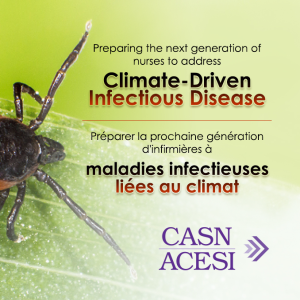 Synopsis
Synopsis
The Canadian Association of Schools of Nursing (CASN) is pleased to announce a new project, funded by the Public Health Agency of Canada, to prepare the next generation of nurses to address climate-driven vector-borne diseases (VBDs). In partnership with the Canadian Alliance of Nurse Educators Using Simulation (CAN-Sim), CASN will develop a series of interactive simulations to showcase the critical role nurses play in navigating the health impacts of the climate crisis; the simulations will focus on risks, prevention, and treatment of VBDs. A companion guide will provide nurse educators and self-directed learners with helpful guidance for completing the simulations or implementing them in education programs. In addition, CASN will revamp the existing VBD e-resource to contain the most up-to-date best practices and information about emerging VBDs. All resources will be freely accessible in both French and English, available in 2026. Stay tuned to CASN.ca and follow CASN for updates on this and other free nursing education resources.
“Every year, Canadians are reminded of the impacts climate change has on our health. This summer, major cities were blanketed in hazardous smog from the worst forest fire season in Canadian history. Unfortunately, climate change is also having an impact on infectious diseases. Just like we have begun to adapt to more damaging forest fire seasons, we also need to prepare for emerging threats from infectious diseases. Through projects like those announced today, all levels of government, universities, health professional organizations and communities can work together to better predict and monitor the risks of these infectious diseases and empower people in Canada to adapt and make informed decisions, improving health outcomes for everyone.”
The Honourable Mark Holland, Minister of Health
Background
As a result of the climate crisis, vector-borne diseases (VBDs) are on the rise across Canada (Berry & Schnitter, 2022; Elmieh & National Collaborating Centre for Environmental Health, 2022). Nurses represent the largest group of health professionals globally and have a significant role to play in addressing the health impacts of the climate crisis (International Council of Nurses, 2018). However, how to prepare nurses to do so is not well understood (Vandenberg et al., 2023). As tick-borne and mosquito-borne illnesses continue to rise in Canada and as the landscape of prevention, and treatment advances, nurses must be supported in this role.
CASN is a national non-profit organization that represents baccalaureate and graduate nursing programs and establishes standards of excellence for nursing education in Canada. In 2018, CASN received funding from the Public Health Agency of Canada for a project titled “Empowering the next generation of health care professionals with knowledge, skills, tools, and supports to address infectious disease related to climate change in Canada.” As part of this project, CASN published the Guidelines for Undergraduate Nursing Education on Climate-Driven Vector-Borne Diseases in 2020. These guidelines delineate the key knowledge, skills, and attitudes that all new registered nursing graduates should possess to care for individuals, families, communities, and populations at risk of or currently being affected by climate-driven VBDs.
In 2021, CASN published the Nursing and Climate Driven Vector-Borne Disease e-resource to facilitate and foster the integration of the health effects of the climate crisis in nursing programs across Canada.
Project Goal and Objectives
Our aim in conducting this project is to strengthen and expand the capacity of health professionals to address tick-borne and mosquito-borne priority diseases occurring as a result of our changing climate. The goal of the project is to ensure that current and future nurses have the knowledge and capacity to reduce the risks and the effects of climate driven vector-borne infectious diseases on the health of Canadians. This goal will be achieved by ensuring the currency of the e-resource in a fast-changing landscape, by creating new, complimentary learning tools, and by amplifying the uptake of CASN’s vector-borne disease materials.
Project Outputs
Virtual Simulations
Over the course of this project, CASN will develop five virtual simulations in partnership with the Canadian Alliance of Nurse Educators Using Simulation (CAN-Sim). The virtual simulations will tie directly to the Guidelines, with particular emphasis on risks, prevention, and treatment of VBDs. They will also highlight the critical role nurses play in patient education and advocacy related to the climate crisis and VBDs. To increase the effectiveness and the satisfaction of the learners, a companion guide to the simulations will provide implementation guidance.
Updated E-resource
Each of the five modules in the existing e-resource will be reviewed for accuracy, currency, and accessibility. New content that reflects emerging VBDs, updated best practices in treatment and prevention, and new approaches for education and advocacy will be incorporated.
Access
The simulations and e-resources will be freely available in both French and English on the CASN website. CASN’s full spectrum of far-reaching communications mechanisms will ensure a nationwide distribution and maximize potential uptake by health professionals.
Contact
For more information about the project, please contact Kristine Crosby, Managing Director, Strategic Initiatives, at kcrosby@casn.ca.
Disclaimer: The views expressed herein do not necessarily represent the views of the Public Health Agency of Canada.


